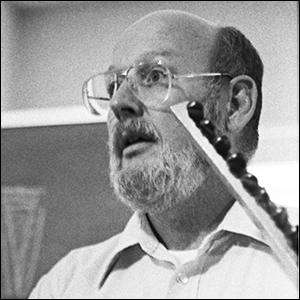| In Memoriam: Robert S. Cooper February 20, 1928 — November 24, 2016 |
|
| Robert Cooper, author of the book Lute Construction passed away this past November. Although I never met Robert in person, my first contact with him was in 1968 when I discovered his book and used it to make my first Renaissance lute. I still have the mold which I made from his instructions. In many ways, it was this foray into the lute from the guitar that started my interest in “early music,” later leading to many more lutes and even harpsichords. Many years later we spoke on the phone and Robert ordered a guitar from me, which I was extremely honored to make for him. Robert was a consummate craftsman and a perfectionist in everything he did. His lute construction book was based on the lutes made by the Hauser family and he had Hermann Hauser II personally check his technical drawings to make sure they were accurate before publishing. Robert had been friends with the Hausers, and had even purchased one of their guitars, which I later sold for him. He was very active in the radio-control model airplane hobby, and his scale replicas of WWI vintage biplanes were paragons of patient detail. He even made his own scale operational engines, and only recently had finally given up flying his creations. Remembering my own experiences with model airplanes (straight up, stall, straight down, build another) I was shocked that he would allow them to be flown at all. I have never seen finer model aircraft. I will miss our friendly phone conversations which ranged over a wide variety of topics. My condolences to his family. Robert Scotland Cooper Sr. was the son of Cdr. Henry George Cooper, USN. In the years leading up to WWII, Commander Cooper served with distinction at posts near and distant, and Robert often proudly claimed that he had attended thirteen grammar schools during his formative years. He lived for periods in Atlanta, Georgia; Charleston, South Carolina; Newport, Rhode Island; New Orleans, Louisiana; and attended Pearl River Military Academy. But he loved most the time he spent with his parents, his brother Samuel, and sister Caroline in the Orient. An avid and gifted storyteller, he often shared vivid memories of his mother Janet, a Sorbonne-trained artist, painting scenes along the seawall at the Olongapo Naval Base on Subic Bay in the Philippines. His tales were full of the taste of sweet mangoes, gentle air, and the fascinating people he knew there though he was only six at the time. Robert completed his bachelor’s degree at The Citadel Military Academy in Charleston in 1951. His passion for all things aeronautical led him to take a job at the Cleveland Model and Supply Company in Ohio, and many people he met there remained lifelong friends. His natural musical talents flourished and he started performing with his clear tenor voice and a classical guitar. Fortune brought him to Savannah in 1953 where he met and married his soulmate Emmeline and began his twenty-seven-year career with the Corps of Engineers. Pioneers at heart, they purchased a ramshackle boarding house in 1959 with terrifyingly high mortgage payments of $69 per month. That house was filled with laughter and music and jovial evenings gathered around the kitchen table. Robert had a woodworking shop there and became renowned for his fine and imaginative woodworking skills. He began building lutes, and his enthusiasm to renew interest in then-obscure early instruments prompted him to publish his book Lute Construction in 1963. His scale models of primarily WWI-era airplanes are recognized as some of the finest in the country. Music, airplanes, and woodworking were the things Robert Cooper did, but they are not who he was. He was always busy in his shop but he was never too busy for his sons Ruskin, Robert Jr., and Graham whether it was a science project or just a tricky part of an airplane model. He was a patient and encouraging teacher. He had a way of seeing the final product and knew how to get a job done the right way. He said that when he was working on a lute or an airplane, time had no meaning. |
Top of Page |

